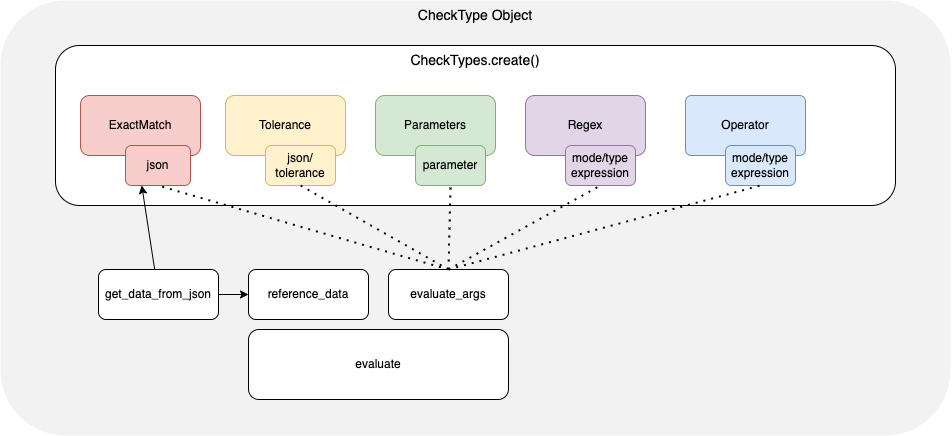Library Architecture¶
 |
|---|
jdiff architecture |
We use the CheckType factory class method create along with the specified check type to instantiate a concrete object of the specified CheckType class.
from jdiff import CheckType, extract_data_from_json
check = CheckType.create("exact_match")
>>> <jdiff.check_types.ExactMatchType at 0x10a618e80>
exact_matchtoleranceparameter_matchregexoperator
Next, load a JSON object as reference data. as well as a JMESPath expression to extract the values wanted and pass them to extract_data_from_json method. Be aware! jdiff works with a customized version of JMESPath. More on that below.
We'll use data from the tests folder. We assume the current working directory is the root of the repo if you've cloned it.
>>> bgp_reference_state = json.load(open("tests/mock/napalm_get_bgp_neighbors/pre.json"))
>>> bgp_jmspath_exp = "global.$peers$.*.*.ipv4.[accepted_prefixes,received_prefixes,sent_prefixes]"
>>> bgp_reference_value = extract_data_from_json(bgp_reference_state, bgp_jmspath_exp)
Once the pre-change values are extracted, we would need to evaluate them against our post-change value. In the case of check-type exact_match, our post value would be another JSON object:
>>> bgp_comparison_state = json.load(open("tests/mock/napalm_get_bgp_neighbors/post.json"))
>>> bgp_comparison_value = extract_data_from_json(bgp_comparison_state, bgp_jmspath_exp)
Each check type expects different types of arguments based on how and what they are checking. For example: check type tolerance needs a tolerance argument, whereas parameter_match expects a dictionary.
Now that we have pre and post data, we use the evaluate method to compare them, which will return our evaluation result.
>>> check = CheckType.create(check_type="exact_match")
>>> results = check.evaluate(bgp_reference_value, bgp_comparison_value)
>>> results
({'10.1.0.0': {'accepted_prefixes': {'new_value': 900, 'old_value': 1000},
'received_prefixes': {'new_value': 999, 'old_value': 1000},
'sent_prefixes': {'new_value': 1011, 'old_value': 1000}}},
False)
Arguments¶
Generally, for all of the CheckTypes, the arguments will be in the order intended state, actual state, options. For instance, the reference state would be the first argument and comparison state the second argument in the exact_match check type.
For regex or parameter matching, your provided regex or dictionary would be the first argument and the collected data would be the second argument.
Customized JMESPath¶
Since jdiff works with JSON objects as data inputs, JMESPath was the obvious choice for traversing the data and extracting the value(s) to compare. However, JMESPath has a limitation where context is lost for the values it collects, in other words, for each given value that JMESPath returns, we cannot be sure what key it was part of.
Below is the output of show bgp.
>>> data = {
"result": [
{
"vrfs": {
"default": {
"peerList": [
{
"linkType": "external",
"localAsn": "65130.1100",
"prefixesSent": 50,
"receivedUpdates": 0,
"peerAddress": "7.7.7.7",
"state": "Idle",
"updownTime": 1394,
"asn": "1.2354",
"routerId": "0.0.0.0"
},
{
"linkType": "external",
"localAsn": "65130.1100",
"receivedUpdates": 0,
"peerAddress": "10.1.0.0",
"state": "Connected",
"updownTime": 1394,
"asn": "1.2354",
"routerId": "0.0.0.0"
}
]
}
}
}
]
}
A JMESPath expression to extract state is shown below.
>>> path = result[0].vrfs.default.peerList[*].state
...which will return
>>> extract_data_from_json(data, path)
["Idle", "Connected"]
How can we understand that Idle is relative to peer 7.7.7.7 and Connected to peer 10.1.0.0?
We could index the output, but that would require some post-processing of the data. For that reason, jdiff uses a customized version of JMESPath where it is possible to define a reference key for the value(s) wanted. The reference key must be within $ sign anchors and defined in a list, together with the value(s):
>>> path = "result[0].vrfs.default.peerList[*].[$peerAddress$,state]"
That would give us...
>>> extract_data_from_json(pre,path)
[{'7.7.7.7': {'state': 'Idle'}}, {'10.1.0.0': {'state': 'Connected'}}]